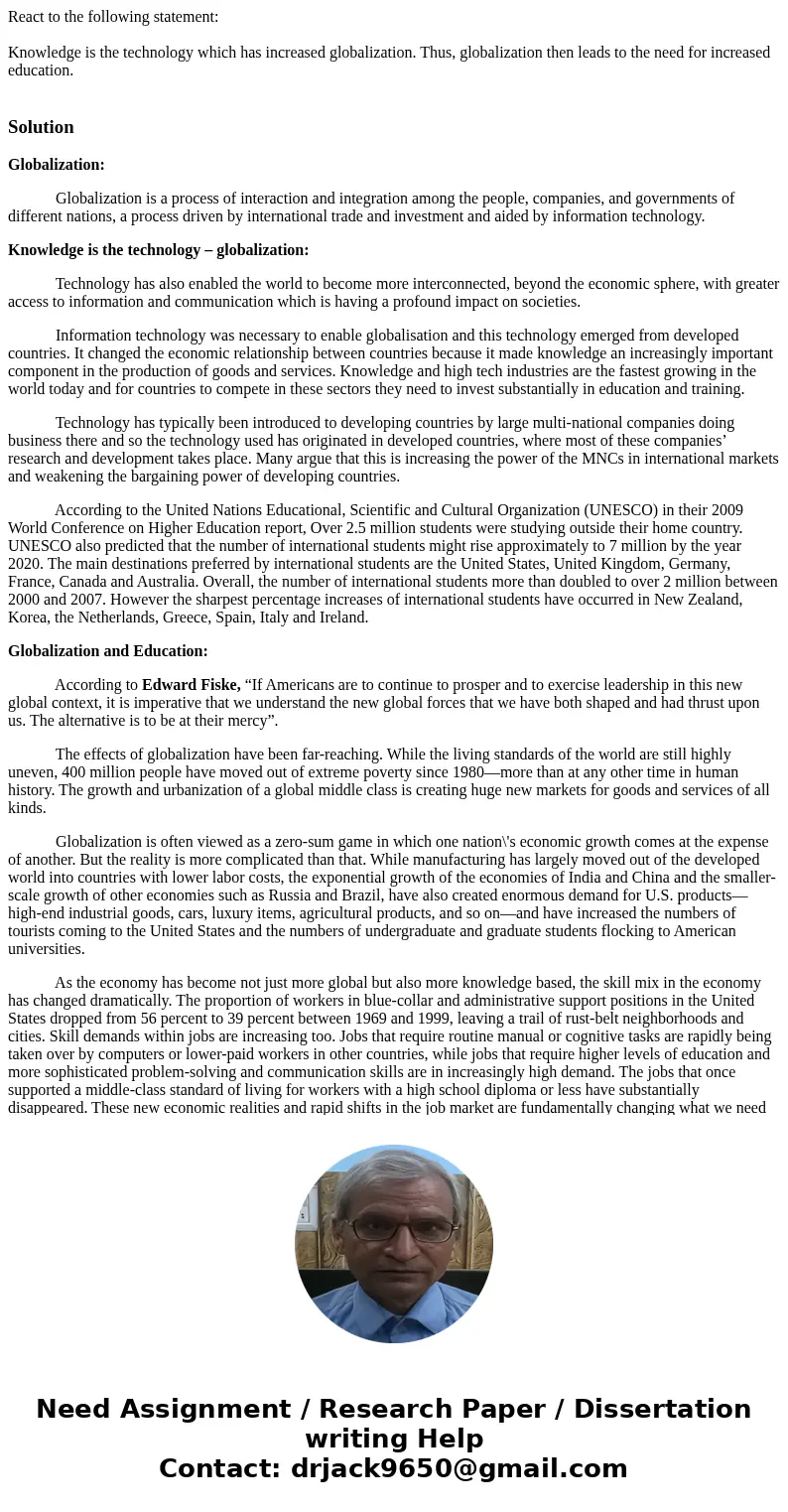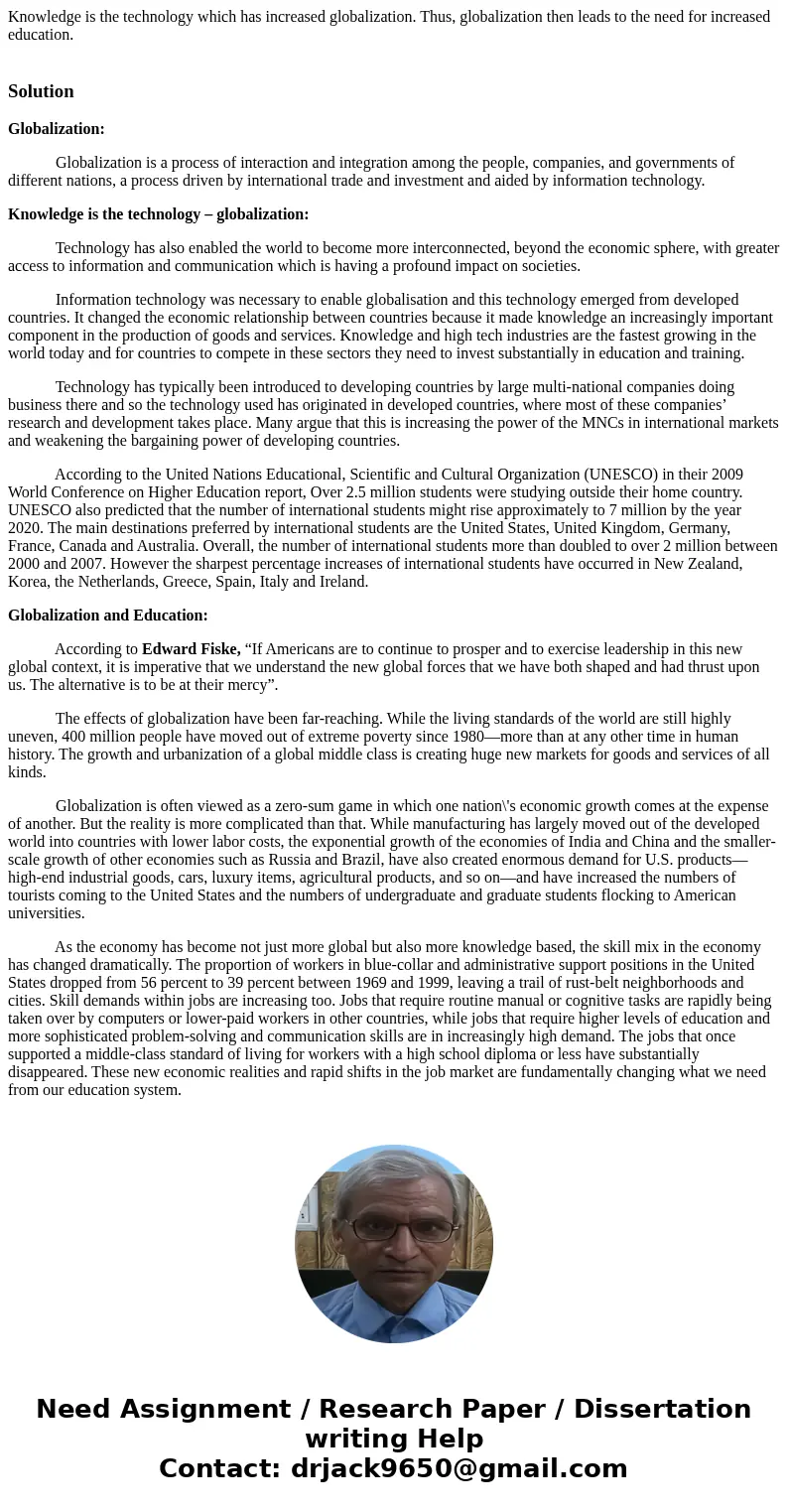React to the following statement Knowledge is the technology
React to the following statement:
Knowledge is the technology which has increased globalization. Thus, globalization then leads to the need for increased education.
Solution
Globalization:
Globalization is a process of interaction and integration among the people, companies, and governments of different nations, a process driven by international trade and investment and aided by information technology.
Knowledge is the technology – globalization:
Technology has also enabled the world to become more interconnected, beyond the economic sphere, with greater access to information and communication which is having a profound impact on societies.
Information technology was necessary to enable globalisation and this technology emerged from developed countries. It changed the economic relationship between countries because it made knowledge an increasingly important component in the production of goods and services. Knowledge and high tech industries are the fastest growing in the world today and for countries to compete in these sectors they need to invest substantially in education and training.
Technology has typically been introduced to developing countries by large multi-national companies doing business there and so the technology used has originated in developed countries, where most of these companies’ research and development takes place. Many argue that this is increasing the power of the MNCs in international markets and weakening the bargaining power of developing countries.
According to the United Nations Educational, Scientific and Cultural Organization (UNESCO) in their 2009 World Conference on Higher Education report, Over 2.5 million students were studying outside their home country. UNESCO also predicted that the number of international students might rise approximately to 7 million by the year 2020. The main destinations preferred by international students are the United States, United Kingdom, Germany, France, Canada and Australia. Overall, the number of international students more than doubled to over 2 million between 2000 and 2007. However the sharpest percentage increases of international students have occurred in New Zealand, Korea, the Netherlands, Greece, Spain, Italy and Ireland.
Globalization and Education:
According to Edward Fiske, “If Americans are to continue to prosper and to exercise leadership in this new global context, it is imperative that we understand the new global forces that we have both shaped and had thrust upon us. The alternative is to be at their mercy”.
The effects of globalization have been far-reaching. While the living standards of the world are still highly uneven, 400 million people have moved out of extreme poverty since 1980—more than at any other time in human history. The growth and urbanization of a global middle class is creating huge new markets for goods and services of all kinds.
Globalization is often viewed as a zero-sum game in which one nation\'s economic growth comes at the expense of another. But the reality is more complicated than that. While manufacturing has largely moved out of the developed world into countries with lower labor costs, the exponential growth of the economies of India and China and the smaller-scale growth of other economies such as Russia and Brazil, have also created enormous demand for U.S. products—high-end industrial goods, cars, luxury items, agricultural products, and so on—and have increased the numbers of tourists coming to the United States and the numbers of undergraduate and graduate students flocking to American universities.
As the economy has become not just more global but also more knowledge based, the skill mix in the economy has changed dramatically. The proportion of workers in blue-collar and administrative support positions in the United States dropped from 56 percent to 39 percent between 1969 and 1999, leaving a trail of rust-belt neighborhoods and cities. Skill demands within jobs are increasing too. Jobs that require routine manual or cognitive tasks are rapidly being taken over by computers or lower-paid workers in other countries, while jobs that require higher levels of education and more sophisticated problem-solving and communication skills are in increasingly high demand. The jobs that once supported a middle-class standard of living for workers with a high school diploma or less have substantially disappeared. These new economic realities and rapid shifts in the job market are fundamentally changing what we need from our education system.


 Homework Sourse
Homework Sourse